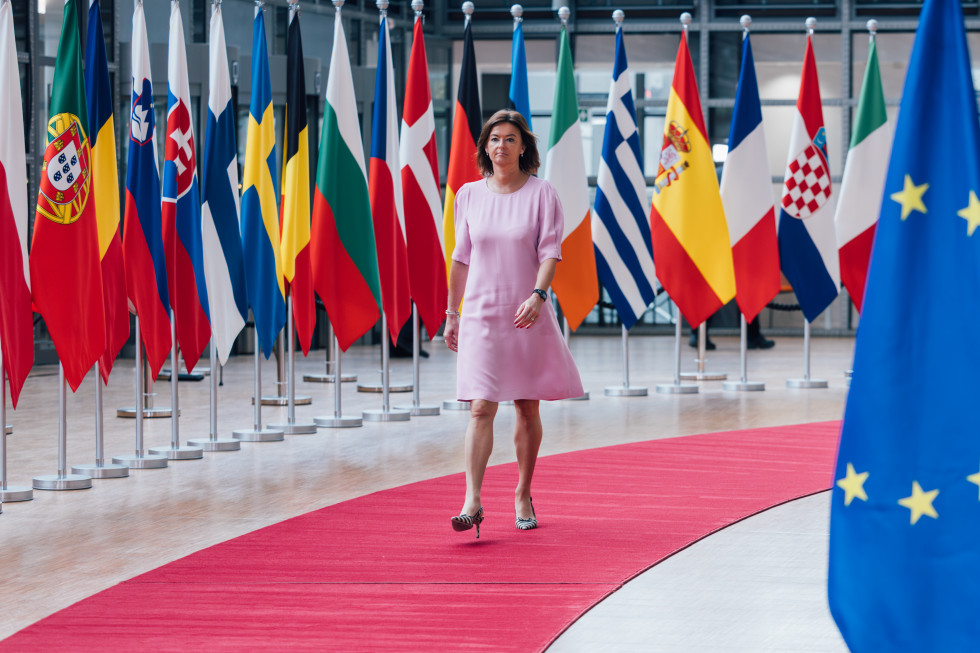Minister Fajon: Urgent return to diplomacy and political dialogue needed in the Middle East

Minister Tanja Fajon at the EU Foreign Affairs Council meeting | Author Ministrstvo za zunanje in evropske zadeve
With regard to the broader Middle East region, ministers focused on recent developments in Iran. In this context, Minister Fajon reiterated Slovenia’s call for restraint on all sides in actions that could escalate tensions in the region and detract from prospects for peace. She urged an immediate cessation of hostilities. “Slovenia calls for respect for international law, the protection of civilians and a return to diplomacy and political dialogue,” she stressed, emphasising the need for EU unity on this issue: “The EU must maintain its credibility and unequivocally condemn any attack on nuclear facilities, regardless of the perpetrator. Such acts are environmentally irresponsible and pose a direct threat to public health. Failing to act sends the message that power prevails over rules when it comes to the superpowers.” She reaffirmed Slovenia’s firm stance against nuclear proliferation and expressed concern over the scale and unclear nature of Iran’s nuclear programme. The Minister also briefed her counterparts on Slovenia’s activities in the UN Security Council relating to this matter. Ministers had already discussed the situation in Iran at an informal meeting held ahead of the Council session.
Minister Fajon then turned to the dire humanitarian crisis in Gaza and the West Bank. “More than 55,000 people have lost their lives in Gaza, and almost the entire population is experiencing acute food insecurity. I urge the EU to adopt a common position that Israel is in breach of its obligations under Article 2 of the EU-Israel Association Agreement. A review of Israel’s compliance with this article has revealed indications of systematic violations of international humanitarian and human rights law in Gaza and the West Bank,” Minister Fajon said during the debate. She further called for the prompt reconvening in New York of the High-Level International Conference for the Peaceful Settlement of the Question of Palestine and the Implementation of the Two-State Solution.
On the issue of Ukraine, Minister Fajon called for an immediate and unconditional ceasefire, underlining the need to maintain focus on forcibly relocated Ukrainian children and detained civilians, including journalists. She highlighted the importance of strengthening EU dialogue with global partners and expressed support for the opening of the first negotiating cluster with Ukraine. At the same time, she condemned Russia’s latest attacks on Ukrainian cities, noting that the situation in the Middle East must not divert attention from the ongoing war in Europe: “The latest attacks show a complete disregard for international humanitarian law and demonstrate Russia’s unwillingness to pursue peace. Slovenia supports a just and lasting peace that is acceptable to Ukraine and based on international law.”
Ministers also discussed China and European security. “We must maintain an open dialogue with China, particularly in areas of shared interest. At the same time, we need to address issues where our positions diverge. Slovenia supports a balanced approach to relations with China,” the Minister said in her intervention. She also voiced concern regarding China's support for Russia in the context of the war in Ukraine.
Under ‘Any Other Business’, Minister Fajon addressed the issue of sanctions imposed against judges of the International Criminal Court and advocated the safeguarding of judicial independence. She proposed that the European Commission explore mechanisms to protect Slovenian judge Beti Hohler and the Court, including the possible activation of the so-called ‘blocking statute’. She also presented the Slovenian non-paper as part of the joint MED9 contribution to the New Pact for the Mediterranean.
Following the meeting, Minister Fajon is scheduled to meet with European Commissioner for Enlargement, Marta Kos, to discuss the progress of individual Western Balkan countries on their path towards EU membership.

